There are countless companies in the fintech industry that are working hard to change the world.
Not only are they providing solutions to longstanding problems, but they are empowering Americans of all generations with the tools they need to realize financial freedom.
And yet, many of the best and brightest in the world of fintech seem to go unnoticed.
They’re not on the cover of Forbes, they don’t get write-ups in the Times, and they probably aren’t taking home the top prize at any of the fintech awards conferences.
But here’s the thing: they’re more than okay with that. Why? Because they’re not in it for the accolades.
They’re in it to drive our industry forward with products and services that truly matter.
In my opinion, these are the fintech companies that deserve our fullest attention, and in today’s article, we’re going to give it to them, starting with my adopted hometown of Austin, Texas. Buckle up and get ready for CSTMR’s list of top fintech companies in ATX for 2023.
First Things First: Why Austin?
I’m Rory Holland, by the way. Founder and CEO of CSTMR (“customer”), a full-service fintech and financial services marketing agency.
Though we’re based in Austin, our distributed team of strategists, specialists, designers, and writers collaborate from across the U.S. and the world at large. Location isn’t important when your team has experience, exceptional skills, and the will to make a positive impact,
While we’re grateful to have a global presence, we’re headquartered in Austin for a reason.
Actually, several reasons.
For starters, Austin unites the business acumen of Wall Street, the innovation of Silicon Valley, and the creativity of San Fran and LA with the community-driven heart of old-school Americana.
And though our post-pandemic world has enabled many people to live wherever they want, more and more are choosing Austin.
In 2020, an average of 180 people moved to Austin every day. Plus, one out of every ten people moving to Texas comes from California—my family included.
Austin is a magnetic place. You see it in:
- Financing: in 2021 alone, venture capitalists invested over $5.5 billion in Austin.
- Population: Austin is now the second fastest-growing city in the U.S.
- Education: Austin ranks #1 for the Best College Towns and Cities in America.
But statistics only introduce the story. The culture tells the larger tale.
Just take a look at the robust culinary, musical, and artistic scenes—there’s never a dull moment. If it’s happening, it’s happening in Austin.
My ideal night? A bite at Emmer & Rye, then a show at ACL Live. Thank me later.
Throw in the fact that Texas is business-friendly with zero state income taxes, and it’s no wonder major companies like Tesla and Oracle have made Austin their home base.
The top fintech companies and startups coming to Austin are betting on themselves. This unique vitality and enthusiasm, generated by a confident culture that believes in itself and in its enduring potential, is a fertile ground for fintech success.
Real Products for Real People

I’ve been in digital marketing and financial services for over 20 years.
I realize what makes Austin fintech companies so special: the vast majority of them want more than money alone. They want to change lives.
They value the vertical plane of personal well-being just as much as the horizontal plane of profit.
In other words, Austin fintech companies are keenly aware of the people they serve, and their products reflect that.
That’s why I’m here, and why CSTMR is headquartered here.
When I meet with entrepreneurs here, they ask questions about possibilities, rather than outcomes; their sentences often start with “our customers’ needs” instead of “my needs.”
In my experience, the personal well-being of clients and the potential for profit aren’t mutually exclusive. They go hand-in-hand, especially in the world of fintech and financial services.
For my part, I want Austin fintechs to succeed. The way I see it, we’re not just in the same business: we share the same backyard.
While I can’t hand out a Grammy or an Oscar, CSTMR and I can help support fellow Austinite businesses by shining a light on those innovative fintechs that are truly making a difference.
The Top 20 Austin FinTech Companies to Watch
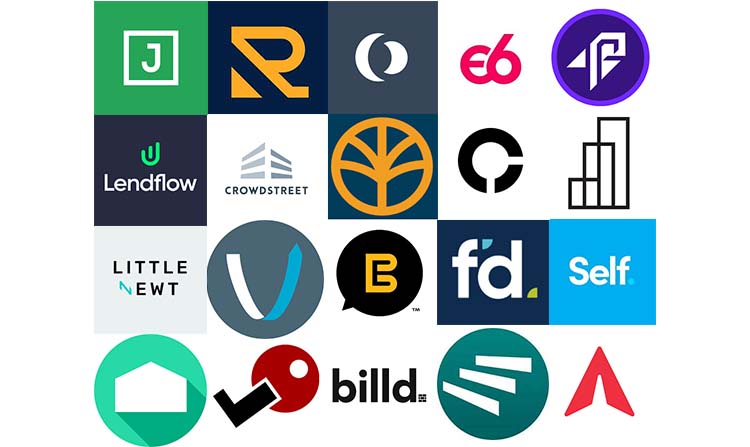
While each of these companies is thriving in unique ways, they all share one thing in common: they’re making the world a better place—one individual at a time.
Though we’re not affiliated with any of these companies, we’re thrilled to celebrate their success.
After all, we recognize their alignment with our own founding mission: “to empower every person on the planet to live a more financially fulfilling, confident, and successful life.”
Presented in no particular order, these are some of the visionary companies, inspiring leadership teams, and amazing financial products coming out of Austin, Texas.
StellarFi

After launching in June 2022, StellarFi, a credit-building bill-pay app, quickly made waves in the fintech world.
Its mission was clear: to disrupt the U.S. poverty cycle by opening access to credit for over 132 million Americans who currently have poor or no credit.
It’s an ambitious goal, but with Founder and CEO Lamine Zarrad at the helm, it’s attainable.
After working as a U.S. Treasury Bank Department bank examiner, Zarrad founded Tokken and Joust, and also served as Head of Product for ZenBusiness, which he helped grow from a valuation of $55M to $1.8B during his tenure.
With StellarFi, a public benefit corporation, Zarrad wants to empower users to build credit by reporting their bill payments directly to the big three credit bureaus.
Last November, StellarFi announced it had exceeded $1 million in ARR, defying the industry’s most pessimistic doom and gloom forecasters.
As Zarrad pointed out, “the path to surpassing $1 million in annual recurring revenue is typically a much longer journey for most startups. Even with economic headwinds, the convergence of StellarFi’s top-notch team, its superb tech, and the market opportunity has made this achievement possible.”
The future looks stellar, indeed.
Self Financial, Inc.
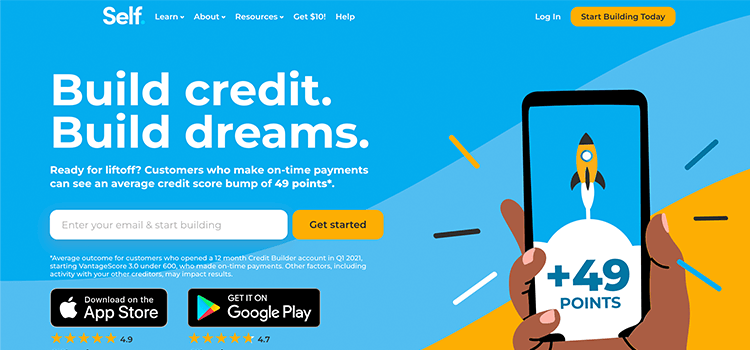
Prior to the “fintech revolution,” subprime consumers had few avenues to build credit.
Self Financial has changed the game, offering installment loans that enable people to build a positive payment history, while saving money along the way.
The best part? Consumers don’t even need a credit score to get started.
Self Financial is led by CEO James Garvey, who’s both a visionary and a genuinely great guy—I’ve had the chance to meet him several times around Austin.
In fact, the origins of Self Financial start with…well, himself. Garvey founded the firm after missing some credit card payments and getting behind the proverbial eight-ball. Fortunately, his struggle gave way to a solution.
“To get credit, you need to have credit,” Garvey says. “It’s a catch-22, and the system is up against you.”
Self Financial’s lead financier, Altos Ventures, has supreme confidence in the company’s future. According to Altos Managing Director Anthony Lee, “Self has had a clear mission from day one: to build credit and savings for millions of Americans who are marginalized by the mainstream financial system. It’s a mission that is going to take decades to realize, and we are happy to be there for the journey.”
Since its launch, Self Financial has served well over 4 million customers—with a surging revenue stream to boot.
While Self Financial has its eyes set on long-term goals—including expanding into the insurance market—its focus is unfailing. As Garvey puts it, “we believe everyone should have the opportunity to improve their financial future.”
Rabbet
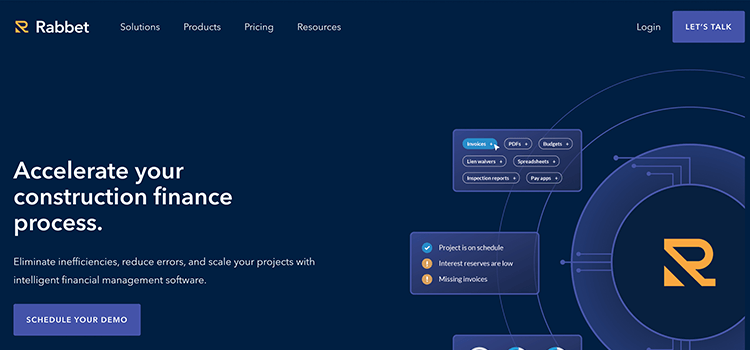
This may be hard to believe, but until recently, the world of real estate was largely managed by Excel spreadsheets.
Despite managing trillions of dollars in construction, most banks were relying on legacy technology to do big business.
Will Mitchell changed all of that.
While in school at UT Austin in 2013, Mitchell identified a desperate need for centralization throughout the construction finance process. That’s when he founded—and became CEO of— Rabbet.
As Mitchell put it, “If there was going to be a technology revolution…I wanted to be a part of it.” Today, Rabbet’s advanced software drives the future of managing construction finances.
Rabbet doesn’t just streamline services, alleviate compliance concerns, and detect errors along the way. It ensures crew members get paid on time and protects the longevity of general contractors, many of whom use retirement savings to float payments to businesses—a distressing trend in the industry.
It’s no surprise the company is backed by firms like Goldman Sachs, QED Investors, and Camber Creek.
As of 2023, Rabbet is officially the leading provider of construction finance software, with over $40 billion of project capital.
Realized

As a real estate “wealthtech” firm, Realized bridges the gap between investment property ownership and sophisticated wealth management.
Though a new niche, it’s already paying dividends for consumers across the U.S.
By leveraging 1031 “like-kind” exchanges, Realized empowers people to invest in commercial property portfolios and generate income, without landlord responsibilities.
More specifically, Realized partners with individuals and families who already own legacy investment properties and are seeking the capital to sustain their lifestyle needs.
By taking a multi-generational approach to wealth management, Realized has made major strides in the market. Last year, the platform exceeded $1 billion in total real statement investments purchased.
According to David Wieland, Realized CEO, “the fact that Realized has reached this ambitious goal in a few short years demonstrates that our team has tapped into a powerful solution and has become a key driver and knowledge center for investment property owners.”
While helping consumers enjoy greater financial freedom, the Realized team is also earning praise. In 2022, the firm was listed as a “Best Place to Work” by the Austin Business Journal.
This coveted award means a lot to Realized COO, Anthony Azar, who knows how competitive Austin can be:
“Successfully recruiting and building a team of elite talent in a city like Austin, where we compete for talent and resources with the likes of Google, Facebook, Amazon, Tesla, and a long list of other household names, is an amazing and humbling experience.”
Rocket Dollar, Inc.
Alternative investments are awesome, but they’ve long remained out of reach for the average investor.
Not anymore.
Under the leadership of CEO Henry Yoshida, Rocket Dollar harnesses the vast constellation of “alts” and puts them in your smartphone pocket with self-directed IRAs and Solo 401(k)s.
Yoshida is a veteran entrepreneur, and his holistic perspective is driving Rocket Dollar’s future.
“After studying this industry for years, we have applied new technology to a paper-driven complex industry that instantly makes investing in alternatives accessible and affordable,” Yoshida says. “This gives control back to clients and opens a wider range of asset classes to savvy investors, without the need for expensive service providers.”
Indeed, Rocket Dollar makes true diversification possible by giving consumers the ability to invest in everything from real estate and farmland, to cryptocurrencies, precious metals, private equity, and more.
Thanks to impressive Series A financing from Park West Asset Management (with participation from Hyphen Capital, Kraken Ventures, and others), Rocket Dollar quickly became the fastest-growing self-directed retirement platform.
And that only accounts for one part of Yoshida’s mission.
Rocket Dollar is also making it easier for startups and existing companies to obtain more capital. In fact, friends, family, and colleagues can use Rocket Dollar to easily invest some of their retirement savings in their startup of choice.
According to Yoshida, “[We have] a commitment to the startup community. We want to help them.”
I’ve been lucky enough to meet Mr. Yoshida several times, and in my opinion, he embodies the absolute best of Austin. He’s forward-thinking, tireless, and dedicated to making sure Rocket Dollar unlocks its limitless potential.
We’re very excited to see what he, and Rocket Dollar, accomplish next.
CrowdStreet

For three consecutive years, Investopedia has named CrowdStreet the Best Overall Crowdfunding Site.
Since 2013, the lending company has launched 700+ institutional-quality real estate deals, delivering average annual returns of 18.3% and total investor distributions of $220 million.
According to Tore Steen, CrowdStreet CEO, “Texas is number one…Of the 460 projects that we’ve listed on our marketplace, over 80 of them have come from Texas alone.”
CrowdStreet was born out of the 2008 financial crisis, when Co-Founders Steen and Darren Powderly recognized a general over-reliance on Wall Street, and sought to give individuals broader access to real estate opportunities.
Crowdfunding provided the ideal path, and CrowdStreet has gained momentum ever since.
Last fall, industry heavyweights Cypress Equity, The Dinerstein Companies, and Foulger-Pratt invested an additional $43 million to further accelerate growth and meet the insatiable demand for online real estate investing.
With this major influx of capital, Steen claims CrowdStreet will continue its expansion and innovation, “helping investors build their financial freedom through direct real estate investing.”
UpEquity

Buying a home is an essential part of the American Dream. Unfortunately, homeownership is rife with challenges, costs, and competition—especially right now.
That’s where UpEquity comes into play.
As a self-described real estate “Power Buyer,” UpEquity seeks to democratize homeownership by transforming homebuyers into cash buyers. Through their flagship programs, “Buy With Cash” and “Buy Before You Sell,” UpEquity helps remove barriers for buyers and sellers alike.
Why cash?
According to UpEquity CEO Tim Herman, “Cash buyers are four times more likely to win a deal versus buyers with financing. And homeowners are much more likely to sell when they are certain they have a place to move into.”
While the concept behind UpEquity certainly seems ingenious, it grew out of a very basic need.
In fact, when Tim Herman missed out on the home of his dreams, he determined to solve accessibility problems throughout the world of real estate.
After meeting Louis Wilson (COO of UpEquity) at Harvard Business School, they decided to tackle the homeownership problems together.
The rest is history.
In 2021, UpEquity closed $25 million in Series A funding, $50 million in Series B (led by S3 Ventures), and posted a staggering growth rate of over 500%.
Last year, UpEquity announced their collaboration with zavvie, further expanding their solutions to real estate brokerages with agents across the country.
It’s clear UpEquity has endless upside potential.
Visio Lending

There are real estate companies, and then there’s Visio Lending: the nation’s leader in loans for single-family rental and vacation properties.
In a market replete with multifaceted corporations, Visio Lending chooses to be laser-focused.
Their mission is clear: to provide fast, simple, dependable mortgages to help investors grow their rental and vacation portfolios. By offering bank rates with private terms, Visio Lending fulfills that mission day in and day out.
The company’s success is largely due to its Founder and CEO, Jeff Ball, who has amassed significant experience across the banking, startup, and real estate sectors.
After running the global semiconductor investment banking practice for JPMorgan, Ball founded EconoHomes in 2006, where he bought and resold over 12,000 single-family residences across the U.S.
By 2012, EconoHomes became the second fastest growing company in Austin, laying the foundation for Ball’s most ambitious venture: Visio Lending.
As Ball sees it, Visio’s “entire organization, technology infrastructure, and business processes are purpose-built to serve these investors who are providing our country with quality, affordable housing.”
Consumers love Visio, and the numbers bear that out. Since its inception, Visio has originated over $2.1 billion in loans, with over 50% of its loans coming from repeat customers.
A Brief Digression: Why Fintech and Financial Services?

People often say to me, “you could choose to work with any industry. Why Fintech?”
Here’s the truth: I love working with fintech companies because they’re actively addressing widespread financial problems with practical, affordable, and marketable solutions.
Maybe they’re focusing on real estate, maybe it’s alternative investing, or maybe it’s personal loans. But however you slice it, they all see the same problems affecting consumers, and they each envision totally unique ways of solving them.
Where they’re unique in their product offerings, they’re unified in their philosophy.
Many Austin fintechs are pursuing the same overarching goal of helping people live more fruitful lives through modern technology.
With that in mind, let’s keep on with the list.
TurnKey Lender
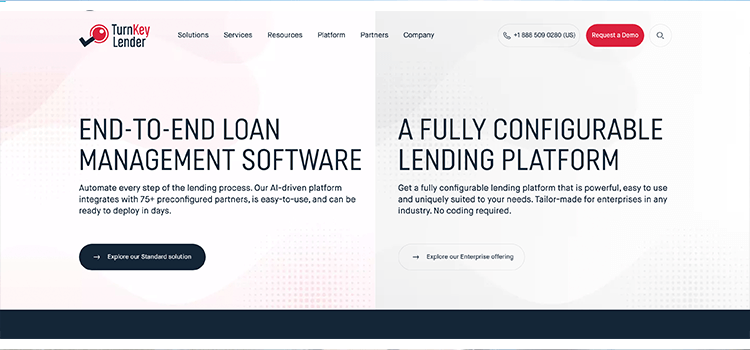
TurnKey Lender has taken aim at democratizing credit with a uniquely powerful solution: an all-in-one SaaS platform that automates every part of the digital lending process.
Best of all, the platform supports numerous credit products out of the box, both commercial and consumer.
Since founding the firm in 2014, CEO Dmitry Voronenko and Co-Founder Elena Ionenko have overseen TurnKey’s rapid expansion, serving customers in 50+ countries with 6 offices around the globe (including Austin).
While Voronenko is thrilled to see consumers benefit from the Turnkey platform—along with an incredible 98.5% customer satisfaction rate—he’s especially proud of another statistic:
“20% of all our clients are nonprofits and companies that extend credit to immigrants, asylum seekers, and underdeveloped communities to bolster the quality of life and speed of business development.”
TurnKey Lender proves that what happens in Austin can affect the entire world.
Homeward
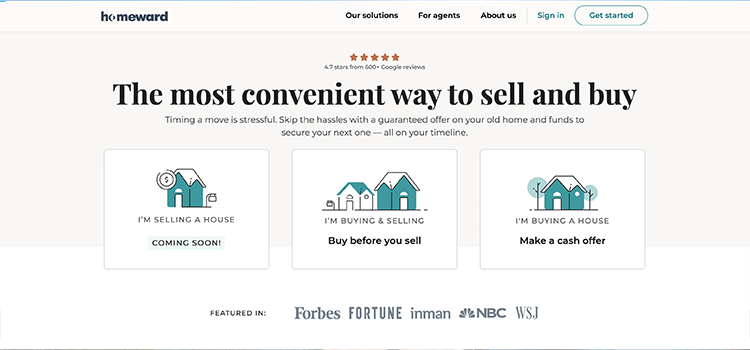
While startups are empowering consumers, they often forget to leverage the expertise of agents.
Until now, that is.
Real estate wunderkind Tim Heyl has redesigned the home buying experience with Homeward, a finance company that partners with agents to help homebuyers overcome the limitations of traditional mortgages.
Rather than displacing agents from real estate transactions, Homeward makes great agents an essential part of the solution. According to Heyl, “people want a local real estate expert in their corner when they make this big purchase. People need that guide.”
Heyl’s outlook and innovation caught fire in the business world, winning elite investors from Blackstone, Credit Suisse, Javelin Venture Partners, and more.
After founding Homeward in 2018, Heyl’s startup raised $105 million in 2020, followed by $371 million Series B funding in 2021.
Customers love Homeward, giving it an impressive 4.7 stars on Google Reviews.
While this story is spectacular, Heyl is no stranger to success. He was named Austin’s #1 real estate agent at age 24 by the Austin Business Journal, and he led his brokerage, The Heyl Group, to be a 4x Inc. 5000 Company.
Mr. Heyl has been on a winning streak for a long time, and it will likely only continue.
First Dollar
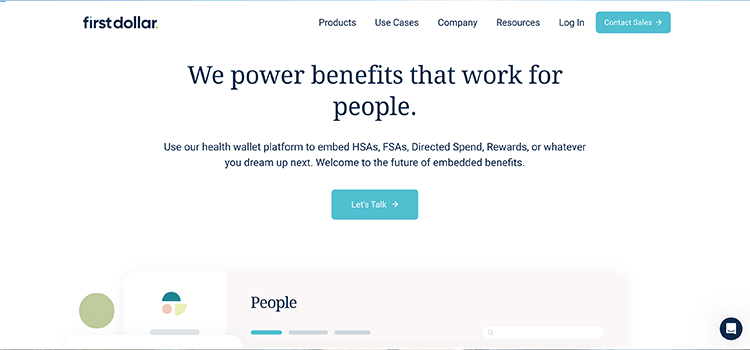
Every December, employees are admonished, “don’t forget to spend your FSA money!”
There’s a good reason for that: unfathomable amounts of annual FSA money typically go unused. In fact, workers lose $3 billion a year in FSA contributions (while employers get to keep the cash).
First Dollar is here to save the day with an advanced “health wallet” platform that has one overarching goal: to ensure all health plans aspire to 100% utilization.
According to the First Dollar mission, “customers who love to use their benefits are cheaper and less expensive to insure. They’re also more loyal. 100% utilization is also just the right thing to do.”
While giving benefit providers the tools they need, First Dollar also empowers consumers to enjoy their hard-earned benefits without the usual FSA-induced hassle.
In other words, First Dollar allows for a spectrum of benefit types to be stacked onto one easy-to-use card. According to Jason Bornhorst, Co-Founder and CEO of First Dollar, “what Stripe has done for e-commerce, we’re trying to do for consumer-directed benefits in healthcare.”
To Bornhorst, simplicity is the ultimate sophistication: “the consumer that is buying healthcare should not have to think about what benefit type they’re using. They just swipe a card, and First Dollar technology routes it to the most appropriate benefit in the backend.”
A few months ago, First Dollar launched its mobile Health Wallet app, providing consumers—and First Dollar partners—with even more convenient tools.
In January 2022, First Dollar raised $14 million in Series A funding led by Blue Venture Fund—a network of Blue Cross Blue Shield (BCBS) companies.
Chipper

The student loan crisis isn’t going away anytime soon.
U.S. college graduates have amassed over $1.75 trillion in loan debt, and while the Biden Administration aims to prove the legality of debt cancellation, millions of Americans are stuck in the crossfire.
Thankfully, Chipper is here to help students get out of debt faster.
Like Acorns and Chime before it, Chipper is a “round up” app with a unique twist: it rounds up everyday purchases to the nearest dollar to pay down college loan principal.
Plus, Chipper helps users find better repayment plans and identify new opportunities for student loan forgiveness.
While Chipper may sound like a response to the national loan debt crisis, it actually has more personal roots.
Chipper Founder and CEO Tony Aguilar is the first person in his family to graduate high school, let alone college. Soon after graduating with a bachelor’s degree in finance, business law, and economics from Indiana University, he was burdened with over six figures in loan debt.
While the numbers were daunting, the lack of resources was even more disconcerting: “I had a mix of federal and private loans with monthly payments that were much higher than I was expecting, and I didn’t know who to call for guidance or advice,” Aguilar said.
Something had to be done.
In 2018, Aguilar founded Chipper, and it didn’t take long for people to enjoy the fruits of his labor. In fact, Chipper saves users an average of $307 per month—$81 million total over the past few years.
While 80,000+ users have benefited from Chipper, Aguilar is only just getting started. After receiving a $5.6 million seed investment last spring, Aguilar remains more committed than ever to helping borrowers break even.
“As we climb, we must pull others along with us where we can,” Aguilar said. “We started Chipper with the mission of helping those hit the hardest by student debt, which are people of color.”
Routefusion

Once upon a time, cross-border payments were maddeningly complex.
Transactions languished on legacy platforms, and compliance issues only made matters worse.
Despite the chaos, there was a growing need to unify an intensely fragmented market.
Routefusion answered the call.
Thanks to the engineering wizardry of Co-Founders Richard Scappaticci Jr. and Colton Seal, Routefusion has empowered customers to access over 12 banking and foreign exchange providers through a single API.
According to CEO Colton Seal, Routefusion has totally changed the game for customers, who see the company “as an extension of their own team,” rather than a third-party jockeying for attention.
While streamlining cross-border payments, Routefusion makes it possible for businesses to expand into new markets in a matter of days (not months), without suffering the setbacks and roadblocks of the past.
After officially launching Routefusion in 2019, Scappaticci Jr. and Seal quickly raised $14.1 million in institutional funding.
With that kind of backing, Routefusion is confidently expanding in Latin America, Europe, the UK, Canada, and potentially Africa.
Everyware
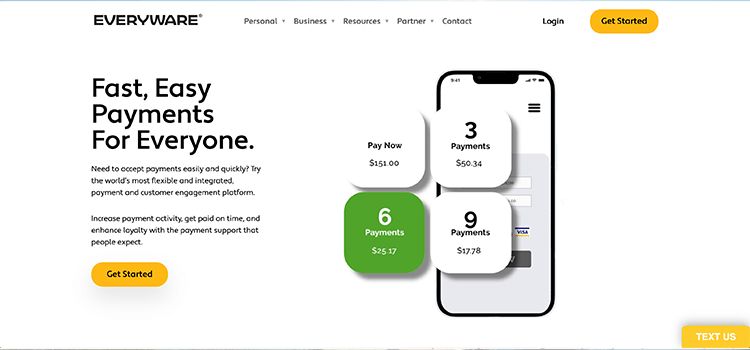
In 2023, convenience is king—especially when it comes to payments.
Enter Everyware, the leading contactless payments and consumer engagement solutions company.
Everyware’s focus? Two-way text messaging, “the ultimate contactless technology,” according to CEO Larry Talley.
While Everyware was born out of a need to simplify (and secure) the payments process, it became the first company to certify the mobile number as an official payment method with the card networks.
That level of innovation has helped clients boost revenue, reduce chargebacks and refunds, and improve customer service across multiple industries, including healthcare, automotive, hospitality, and utilities.
After receiving $9.2 million in total funding, Everyware’s “Pay by Text” platform is now a fixture of contactless payments. Most importantly, it works easily alongside existing systems and can be integrated overnight.
As the name implies (and as Talley insists), “we are Everyware, and we plan to be everywhere.”
Billd

For contractors, payment delays can make business growth seem impossible.
Billd makes things better by providing two essential services:
- Empowering contractors to avoid project hurdles with access to upfront funds.
- Enabling suppliers to sell more materials with significantly reduced risk.
Billd Co-Founders Chris Doyle and Jesse Weissburg have a simple, but powerful ethos:
“We believe contractors should do business on their terms, not anyone else’s.”
As industry veterans, Doyle and Weissburg have seen supply chain finance issues undermine contractors for years. That’s why Billd provides 120-day terms, so contractors can stabilize cash flow and more effectively grow their businesses.
Since founding the company in 2018, Doyle and Weissburg have received $190 million in total funding.
Last fall, Billd closed on a $100 million debt facility to further support increased demand from both new and return customers.
Finally, contractors can grow their businesses without being held back by payment delays.
“The construction industry has left subcontractors footing the bill for materials and labor for too long,” says Billd CEO Doyle. “Billd’s new debt facility is another milestone toward bringing smart, scalable working capital to every commercial subcontractor in the United States.”
Episode Six (E6)

If you haven’t heard of Tritium, you’re in for a treat.
It all starts with Episode Six (E6), an industry leader in the payments space.
While the Austin-based team has been revolutionizing payments since 2015, E6 truly changed the game with their enterprise-grade payment technology platform, Tritium.
While I wouldn’t dare to explain the underpinning data, Tritium essentially allows consumers to leverage real-time payment and value transfer on any network, system, or currency, anywhere in the world.
Paper currency? Check.
Crypto? Check.
Gold? Check.
Rewards points? Check.
Securities? Check.
While CEO John Mitchell has worked in payments for nearly 20 years, E6 is his magnum opus. To provide this level of customization, Mitchell and his team “started from scratch” and purpose-built the technology from the ground up.
After raising $50 million in capital since 2015, and after watching E6 soar in global demand, Mitchell isn’t at all surprised by his company’s success.
“The strong momentum we continue to achieve highlights the rapid adoption of digital transformation in the banking, fintech, insurtech, and broader financial services industries.”
EasyKnock
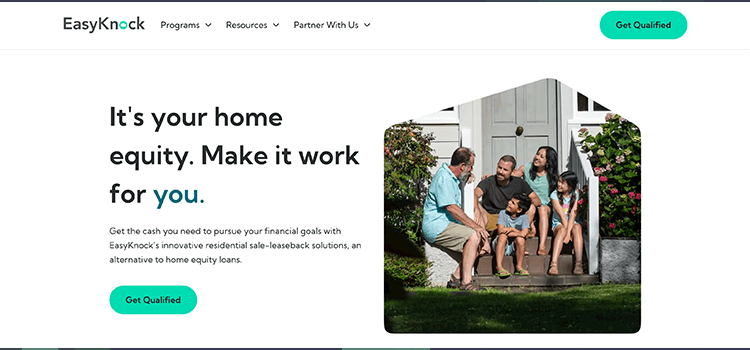
Over 25% of the U.S. housing market has built-up equity and can’t get it out of the house.
That’s the problem EasyKnock, a residential sale-leaseback company, was made to solve.
After all, EasyKnock empowers individuals and families to convert equity in their homes while being able to stay in their homes as a renter.
Here’s how it works: EasyKnock will offer to buy your home and rent it back to you, and at any time during the transaction, you’ll be able to buy back the home or move somewhere new.
As Jared Kessler, Founder and CEO, sees it, “EasyKnock’s commitment to U.S. homeowners is more important than ever while the economy and the housing market continue to face extreme uncertainty.”
Investors agree, having awarded Kessler’s company over $400 million in total funding.
More importantly, consumers are reaping serious rewards from EasyKnock, saving an average of $5,000 on home expenses, enjoying an average of 20% in home value appreciation, and benefiting from an average 35 point credit score increase.
What’s not to like?
(Full disclosure: I broke a rule with this one. EasyKnock isn’t based in Austin—it’s headquartered in NYC. But honestly, they’re such an exciting company, I had to include them on this list.)
LittleNewt
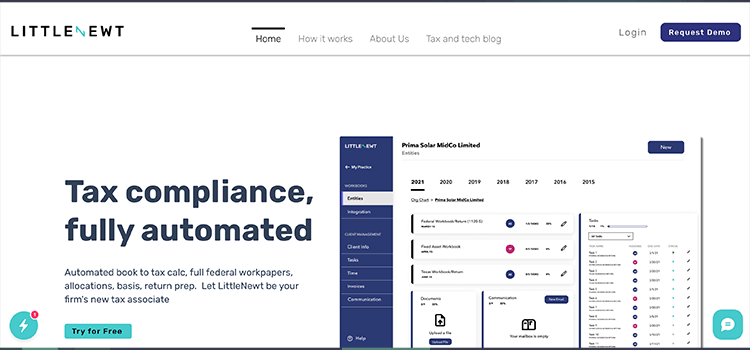
Of all the fintechs in Austin, LittleNewt has one of the most intriguing names.
According to Founder and CEO Chris Mundon, the tax preparation and practice management platform takes its title from his grandfather.
“My dad was a tax CPA…and my granddad was a tax CPA, and his nickname was ‘little newt.’”
Coming from a long line of accountants, Mundon is brutally honest about the difficulties facing CPAs. He describes how the demands of tax season “wrecked three generations of [his] family,” forced him to break promises he couldn’t keep, and cost him important relationships along the way.
LittleNewt was born out of both pain and promise. Mundon founded the firm to honor his grandfather and to “make tax season better and easier for practitioners.”
LittleNewt is succeeding in significant ways.
While reducing costs and inefficiencies, the software platform empowers tax professionals to focus more time on building relationships and enjoying life’s most important events, rather than getting buried in labor-intensive and redundant processes.
Though LittleNewt has only just begun its funding journey, it’s off to a great start after being named to the 2021 New York class of the Barclays Accelerator.
With the right investors and marketing advisors, LittleNewt can do big things.
Lendflow
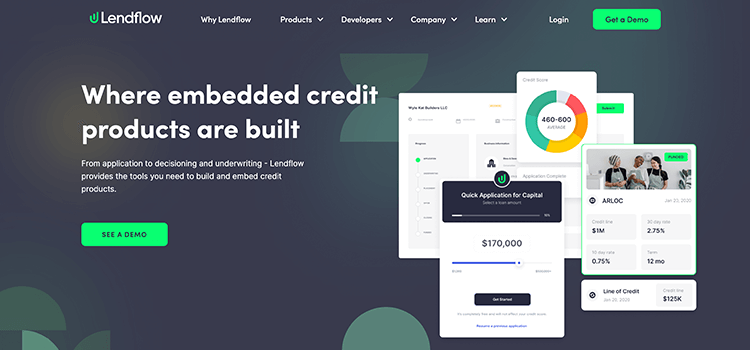
The “democratization of credit” fintech team has gained another all-star player.
With Lendflow, the Byzantine lending infrastructure has finally been modernized (and automated).
And while the SaaS vertical is undoubtedly hyper-competitive, Lendflow is focused on developing strategic alliances.
According to Founder and CEO Jon Fry, Lendflow is poised to “partner with a variety of fintech companies that operate in these different areas to provide an end-to-end platform that allows companies to build, embed, and launch credit products quicker and more efficiently.”
In other words, Lendflow isn’t interested in being the dominant embedded SMB lender—they’re simply empowering others to take on that role as seamlessly as possible.
Investors are intrigued: Lendflow pulled in $10.8 million in Series A funding in 2021, and last fall, they partnered with Ocrolus to more accurately determine the viability of potential borrowers.
“With Ocrolus, our customers can launch new credit products and get to market quickly, as cash flow analysis is at the core of the decisioning process,” Fry says. “In turn, they can help their SMB customers with seamless and faster access to financing they didn’t have before.”
The future is bright for Lendflow.
Juniper Square
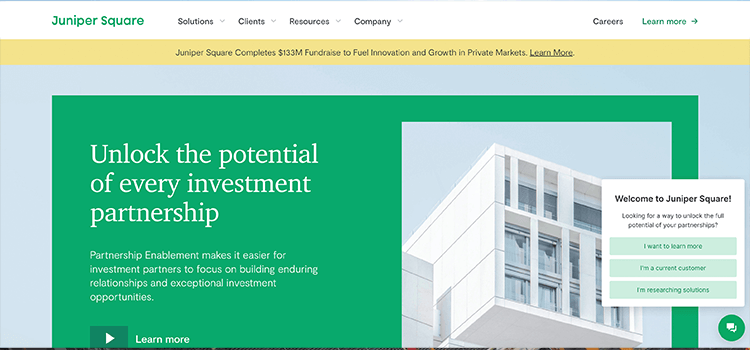
Last but certainly not least, we have Juniper Square: the leader in partnership enablement for the private funds industry.
Through its state-of-the-art platform, Juniper Square streamlines fundraising, investment operations, and investor reporting, while strengthening relationships and investment opportunities along the way.
Led by Co-Founder and CEO Alex Robinson, Juniper Square sets its sights on bringing transparency to commercial real estate, the world’s second-largest asset class.
As Robinson envisions it, “in an ideal world, commercial real estate could be traded with the information, trust, and ease available in public equity markets. Our vision is that one day, an institution or individual could invest in a share of a commercial building just like they would in a share of stock on the NYSE.”
Juniper Square has the backing to pull it off, with $241 million in total funding since its launch in 2014. And they have recently raised an additional $133 million in growth capital, thanks to contributions from Owl Rock, Ribbit Capital, Fifth Wall, Pappy Capital, and others.
Another great example of Austin fintechs bucking doom and gloom forecasts.
Beyond the financials, Juniper Square proudly boasts a 99% retention rate for the company’s portal solution, along with 4.9 stars out of 5 on both Capterra and G2, two respected vendor review websites.
To date, more than 1,800 GPs use Juniper Square to support over 32,000 investment partnerships spanning over 500,000 LPs and $700 billion in LP capital.
Juniper Square is firing on all cylinders.
About CSTMR
Over the years, we’ve had the privilege to work with some amazing fintech companies.
While they each faced unique challenges, they all shared a common cause: to empower people to live financially fulfilling, hopeful, and successful lives.
That’s what motivates our team, and it’s what inspires us to help companies of all sizes find their voice (and their audience) in a crowded marketplace.
The world of fintech is endlessly evolving, and we’re truly confident in what the future holds.
All of the companies we explored today are choosing to bet on themselves, and we encourage you to do the same.
The world needs your ideas, your platforms, and your products—now more than ever.
If you’re based in Austin and want to grab coffee or lunch, let me know! I’d love to compare notes and talk shop. Shoot me an email, or reach out via the CSTMR website, and we’ll put something together.




